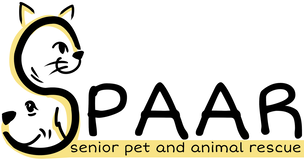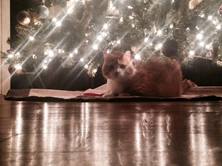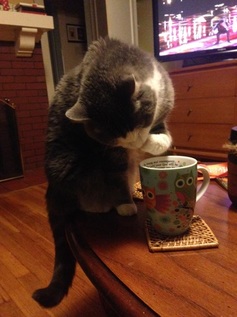| The holidays are a time when homes are filled with family and friends. There is also a lot of noise, unfamiliar people, overwhelming scents, and loud sounds. While some animals may be comfortable with this commotion, many dogs and cats can become easily stressed. Here are a few tips on how to help your pet be more at ease during the active holiday season. |
If your dog is a “jumper” or gets excited easily, try leashing your dog before someone walks through the door. This technique allows you to have some control while your dog greets your guests. Also, you may treat your dog after well-mannered greetings to enforce polite behavior. Once your dog is settled, have your guests randomly treat your dog while visiting, so they can build a positive relationship with each other. Leashing your dog and having a greeting outside of your home can also be a great idea to meet an unfamiliar guest, as long as your dog has had positive leash experiences in the past.
In many instances, separating your dog is the best way to give your pet time to observe and adjust. If you are able to gate your dog in an area to see and smell your visitors, it can create a positive interaction from afar.
While your dog is separated, allow appropriate space for relaxing. If your dog is settled enough, and you trust your guests, have them toss your dog a few treats in the area or crate. You may then let your dog out, making sure to break up vising time, allowing your dog intermittent breaks and rest. Breaks will help your dog absorb the environment in manageable increments.
Please remind your guests, including parents of younger children, to allow your dog to sniff them before they stick their hands out to the dog or bend down to pet your pup. Ask them to “ignore” your dog for a few minutes. Give your dog the opportunity to get used to new visitors.
If your dog does not adjust well with unfamiliar people, give your dog a secluded, comfortable, calm place to rest. Keeping a radio or TV on will help drown out the stressful noise of people coming in and out of the house. Check in on your pup periodically.
Dogs and Dinner Time. Your dog may be used to the “house rules” on a regular day when you are eating, but with guests in the home and lots of delicious food being served or sitting around, your dog's senses may go into overload. Remind your guests not to feed your dog from the table and only give treats or regular dog food with permission. If your dog does not have good self-control when humans are eating, it may be best to separate your dog from the table during dinner. It also may help to either feed your pet before or when the meal is served, so your dog will already be full or occupied with doggie dinnertime.
Cats and New People. Often, cats will initially hide when they are stressed. Let them come around on their own time. If they choose not to visit, check in on them periodically. You may even be able to secure them in a quiet room, away from the commotion. Never force them to greet visitors.
Also, avoid having cats jump on counters or tables where food is being served. Not only is it unsanitary, but your guests may not appreciate your sweet cat's kitty-litter paws walking on the same surface as their dinner.



 RSS Feed
RSS Feed